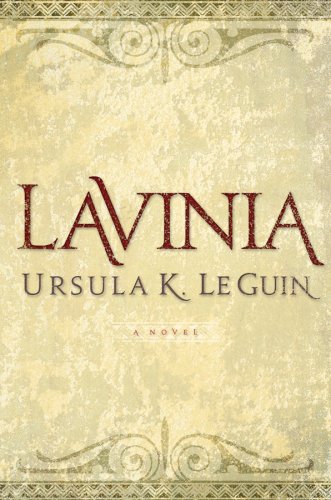Lavinia isn’t a retelling of the Aeneid, and it’s better not to approach it as if it were one. There are all kinds of ways of retelling stories, and this isn’t any of them. Lavinia isn’t really like anything else at all, and it’s much the better for that. Rather, Le Guin has taken the character of Lavinia and let her know who she is. And who is she? She’s the daughter of Latinus, king of Latium; the cause of the war at the very end of the Aeneid; Aeneas’s wife; foremother of the kings of Alba Longa and the kings of Rome but not of Augustus, who was descended from Aeneas’s son by his first wife, Ascanius. Virgil doesn’t give Lavinia much personality, and look how pinned into her own position she is by men and their positions.
Le Guin has been wrestling with the position of women in fantasy worlds since Tehanu (1990). In Lavinia she’s found a way to do it that works for me.
Lavinia is a king’s daughter but she lives a simple life of salt-making and spinning and weaving. She’s a practical girl and Le Guin gives her a first person voice that addresses us directly about her practical concerns. She’s such a well drawn character that she carries us through her certainties, war and peace, festivals and sickness. Her religion is a clear forerunner to Classical Rome, but more practical and everyday. She goes to the oracle at Albunea and is visited not by a god but by the spirit of the dying poet, Virgil, who knows he hasn’t done her justice.
She and Virgil talk, and he tells her the story of the Aeneid, or, looked at another way, of her future husband’s past life. There’s a lot more to the book than that, but that’s the heart of it: a meditation on what it is to be at once a real and fictional character, how your life might be seen in the future as part of something you had no idea about, and Lavinia’s commonsense acceptance of all of this. The ground Virgil and Lavinia meet on is the ground of people who are both real and imagined. At one point he mentions the Underworld:
“How do you know that?”
“I was there.”
“You were there, in the Underworld, with Aeneas?”
“Who else would I be with?” he said. He looked about uncertainly. His voice was low and dull. He went on, hesitant. “It was the Sybil who guided Aeneas… What man did I guide? I met him in a wood, like this. A dark wood, in the middle of the road. I came up from down there to meet him, to show him the way… But when was that? Oh, this dying is a hard business, Lavinia!”
Virgil guides Dante through Hell, of course, as we know and he doesn’t. The poet and the maiden have more things in common than it seems at first, for the poet’s life, too, is reimagined after his death in an unimaginable context. They talk about Aeneas’ life, about Lavinia’s life, about Virgil’s poem that he knows he will not live to revise. On one level the book is about the life of a woman who is hardly more than a token in a great epic poem, on another it’s about how history and context shape how we are seen, and the brief moment there is to act between the inescapable past and the unknowable future.
Perhaps to write Lavinia Le Guin had to live long enough to see her own early books read in a different context from the one where they were written, and to think about what that means.
Le Guin is one of the greatest writers of our genre, fit to put up against the greatest of any genre and any time. She has written books I adore and books that I want to argue with, but she’s never written anything that I didn’t find worth reading. This is a late, elegaic work, and a comparatively minor work, which is still to say that it’s as good or better than anything anyone else is doing. I re-read Lavinia now to see whether I wanted to put it on my Hugo nominating ballot, and I decided I did. There’s no use saying it’s not as good as The Left Hand of Darkness, when it’s definitely one of the best five new books I read last year.










